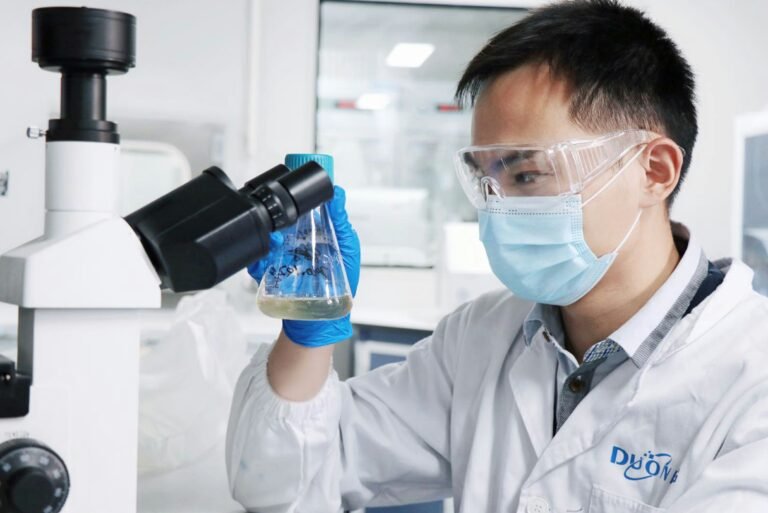Peptides have become one of the most dynamic areas of modern research. These short chains of amino acids act as molecular messengers, influencing processes ranging from muscle repair and fat metabolism to skin health and cognitive performance. Their precision and versatility are driving a surge of interest in UK laboratories exploring human biology and performance optimisation.
What Are Peptides?
Peptides are short chains of 2–50 amino acids, linked by peptide bonds. They’re smaller than proteins, but highly targeted in function. While proteins may act broadly, peptides typically regulate specific processes — from hormone release to tissue repair.
Examples in nature include:
- Insulin (regulates blood glucose)
- Glucagon (stimulates glucose release)
- Oxytocin (social bonding and reproductive functions)
Research peptides are synthetic versions of these naturally occurring messengers, designed to target precise pathways with reproducibility.
How Peptides Work
Peptides function like a key in a lock, binding to receptors on cell surfaces to trigger cascades of biological responses. Depending on the peptide, these effects may include:
- Stimulating protein synthesis for muscle growth
- Supporting collagen production for skin and tissue repair
- Enhancing growth hormone release
- Regulating glucose and metabolism
- Promoting neuroprotection and cognitive support
Because they work with existing biological systems, peptides are considered highly selective — reducing the likelihood of broad, off-target effects compared to traditional drugs.
Why Peptides Are Popular in Research
Precision & Specificity
Peptides can target one receptor or pathway, allowing scientists to isolate effects with clarity.
Advancements in Technology
Modern synthesis methods (solid-phase peptide synthesis, recombinant techniques) make peptides more stable, pure, and affordable.
Versatility
Peptide research spans multiple fields: aging, performance, metabolism, neurology, dermatology.
Natural Compatibility
Since many mimic endogenous molecules, peptides often integrate seamlessly into existing biological processes.
Key Types of Research Peptides
Growth Hormone Secretagogues
- Ipamorelin – Clean GH release without raising cortisol/prolactin.
- CJC-1295 – Sustained GH stimulation, often combined with Ipamorelin.
- Sermorelin & Tesamorelin – GHRH analogs studied for hormone rhythm and body composition.
IGF-1 Research
- IGF-1 LR3 – Long-acting variant studied for direct muscle growth and recovery.
Healing & Regeneration Peptides
- BPC-157 – Investigated for tissue protection and systemic healing.
- TB-500 – Fragment of Thymosin Beta-4, studied for cell migration and vascularisation.
- GHK-Cu – Copper peptide researched for wound repair and skin rejuvenation.
Metabolic & Weight Management Peptides
- Tirzepatide – Dual GIP/GLP-1 agonist (active ingredient in Mounjaro), studied for weight reduction and insulin sensitivity.
- Retatrutide – Triple incretin agonist (GIP, GLP-1, glucagon), researched for metabolic optimisation and fat loss.
Cognitive & Neurological Peptides
- SEMAX – Studied for memory, focus, and neuroprotection.
- Selank – Researched for anxiety regulation and cognitive resilience.
Emerging Research Trends
- Peptide Stacking – Combining peptides (e.g., Ipamorelin + CJC-1295, or SEMAX + Selank) to study synergistic effects.
- Advanced Delivery Systems – Intranasal sprays, topical creams, and oral formulations under investigation.
- Personalised Research – Exploring how genetic and biomarker profiling could inform peptide selection.
Safety & Quality Considerations
Peptide research outcomes depend heavily on compound quality and handling.
- Purity – Bluewell peptides exceed 99% purity, verified by independent labs.
- Storage – Lyophilised peptides stable at –20 °C; reconstituted peptides refrigerated at 2–8 °C.
- Documentation – Certificates of Analysis included with every batch.
- Compliance – Products labelled strictly for research use only, not for human consumption.
Conclusion: Why Peptides Matter in Research
Peptides represent one of the most promising tools for modern science — precise, versatile, and biologically compatible. Whether the focus is muscle growth, healing, skin health, metabolism, or cognition, they allow researchers to study targeted pathways with clarity.
At Bluewell, we supply UK researchers with premium-quality peptides, full documentation, and technical support, ensuring reliable outcomes and reproducibility.
Disclaimer: All Bluewell peptides are for laboratory research use only. They are not intended for human consumption, medical use, or veterinary applications.
Explore our complete peptide range and see how Bluewell can support your next research project.




